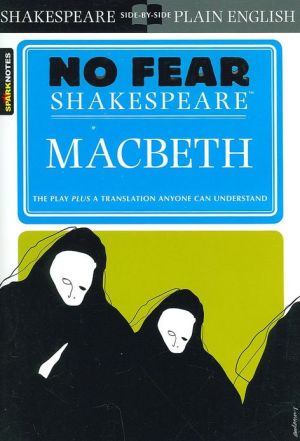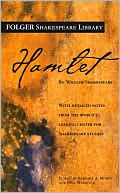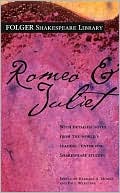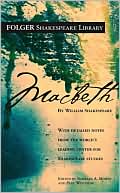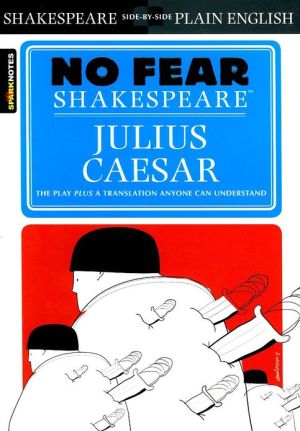Othello (No Fear Shakespeare) (Volume 9)
Read Shakespeare’s plays in all their brilliance—and understand what every word means! Don’t be intimidated by Shakespeare! These popular guides make the Bard’s plays accessible and enjoyable.Each No Fear guide contains: The complete text of the original play A line-by-line translation that puts the words into everyday language A complete list of characters, with descriptions Plenty of helpful commentary
Search in google:
What do you get when a group of Harvard Students creates study guides for the 21st century? Better grades. Not long ago our writers were acing their classes. Now they're loading SparkNotes with concise critical analysis that won't yellow with age. With SparkNotes you'll have an easier time understanding and enjoying great works of literature. SparkNotes -- the smarter, better, faster way to an "A."
\ Cambridge University Press\ 0521618762 - Othello - Edited by Jane Coles\ Excerpt\ \ \ \ \ List of characters\ \ \ \ \ \ OTHELLO\ A black army general in the service of the Duke of Venice\ \ \ DESDEMONA\ Othello's wife, daughter of Brabantio\ \ \ IAGO\ Othello's ensign (standard-bearer)\ \ \ EMILIA\ Iago's wife, companion to Desdemona\ \ \ CASSIO\ Othello's lieutenant\ \ \ BIANCA\ in love with Cassio\ \ \ DUKE OF\ \ \ \ VENICE\ \ \ \ BRABANTIO\ A Venetian senator, father of Desdemona\ \ \ RODERIGO\ A Venetian gentleman, in love with Desdemona\ \ \ GRATIANO\ Brabantio's brother\ \ \ LODOVICO\ Brabantio's relative\ \ \ MONTANO\ Governor of Cyprus\ \ \ Senators of Venice\ \ \ Gentlemen of Cyprus\ \ \ CLOWN\ Servant to Othello\ \ \ Herald\ \ \ \ Messenger\ \ \ \ Musicians, soldiers, attendants, servants\ \ \ Sailor\ \ \ \ The action of the play takes place in Venice and Cyprus.\ \ \ \ Two men are in the middle of an argument. Roderigo accuses Iago of cheating him. Iago is angry about failing to gain the promotion that has gone instead to Michael Cassio.\ \ 1 A dramatic opening (in pairs)\ In the theatres of Shakespeare's time there was no electric lighting and no stage curtain. The playwright had to signal the start of the play by means of a dramatic opening scene. Here, the noisy audience would be silenced by two men in the middle of a heated argument, with much swearing.\ \ Read this opening conversation (lines 1-34) aloud. Try reading it in several different ways to find which way sounds best. Discuss which words in the script gave you clues as to how it should be spoken.\ Film and theatre directors have chosen various ways in which to begin the play (see pp. 240-1 for a detailed activity exploring some of these). Think about ways in which you might want to set the scene, how you might have actors enter the stage, and what sound and lighting effects might suggest a street at night.\ The play opens half-way through an argument. Make up what you think Iago and Roderigo have been saying before the play begins. End your dialogue on the first line of the play.\ \ \ \ 2 Michael Cassio - why does Iago dislike him?\ Iago explains why he believes he has not been promoted to the rank of lieutenant (lines 8-27). Look carefully at the way Iago describes Cassio (lines 19-26) and pick out four key phrases which suggest why Iago is jealous of him.\ \ \ \ Othello, the Moor of Venice\ Act 1 Scene 1\ Venice A street at night\ \ \ \ \ \ Enter RODERIGO and IAGO.\ RODERIGO Tush, never tell me, I take it much unkindly\ That thou, Iago, who hast had my purse\ As if the strings were thine shouldst know of this.\ IAGO 'Sblood, but you will not hear me.\ If ever I did dream of such a matter,\ 5\ \ \ Abhor me.\ RODERIGO Thou told'st me thou didst hold him in thy hate.\ IAGO Despise me if I do not: three great ones of the city,\ In personal suit to make me his lieutenant,\ Off-capped to him; and by the faith of man,\ 10\ \ \ I know my price, I am worth no worse a place.\ But he, as loving his own pride and purposes,\ Evades them with a bombast circumstance,\ Horribly stuffed with epithets of war,\ And in conclusion,\ 15\ \ \ Non-suits my mediators. For 'Certes', says he,\ 'I have already chosen my officer.'\ And what was he?\ Forsooth, a great arithmetician,\ One Michael Cassio, a Florentine,\ 20\ \ \ A fellow almost damned in a fair wife,\ That never set a squadron in the field,\ Nor the devision of a battle knows\ More than a spinster, unless the bookish theoric,\ Wherein the togèd consuls can propose\ 25\ \ \ As masterly as he. Mere prattle without practice\ Is all his soldiership. But he, sir, had the election,\ \ \ \ \ \ \ Iago continues to complain about 'the Moor' and the system of promotion. He says he pretends to be a faithful officer, but follows Othello only to serve his own purposes.\ \ 1 First impressions of Iago (in small groups)\ Read the page of script aloud several times, sharing out the lines.\ On a large plain piece of paper, write IAGO in the centre (see the diagram below) and collect together any key things Iago seems to say about himself. Include anything that reveals something about his character or motivation. On the outer layer of the diagram explain in your own words what you believe each quotation might indicate about him.\ \ \ \ Image not available in HTML version\ \ \ \ \ \ When you have finished, join together with other groups and compare your sheet with theirs. Explain how and why you chose your particular words/phrases/lines.\ Pool your ideas to produce one final diagram for display on your classroom wall.\ \ \ \ \ \ And I, of whom his eyes had seen the proof\ At Rhodes, at Cyprus, and on other grounds\ Christian and heathen, must be lee'd and calmed\ 30\ \ \ By debitor and creditor; this counter-caster,\ He, in good time, must his lieutenant be,\ And I, God bless the mark, his Moorship's ancient.\ RODERIGO By heaven, I rather would have been his hangman.\ IAGO Why, there's no remedy. 'Tis the curse of service;\ 35\ \ \ Preferment goes by letter and affection,\ Not by the old gradation, where each second\ Stood heir to the first. Now sir, be judge yourself\ Whether I in any just term am affined\ To love the Moor.\ RODERIGO I would not follow him then.\ 40\ \ \ IAGO O sir, content you.\ I follow him to serve my turn upon him.\ We cannot all be masters, nor all masters\ Cannot be truly followed. You shall mark\ Many a duteous and knee-crooking knave,\ 45\ \ \ That doting on his own obsequious bondage,\ Wears out his time much like his master's ass\ For nought but provender, and when he's old, cashiered.\ Whip me such honest knaves. Others there are\ Who, trimmed in forms and visages of duty,\ 50\ \ \ Keep yet their hearts attending on themselves,\ And throwing but shows of service on their lords,\ Do well thrive by them; and when they have lined their coats,\ Do themselves homage. These fellows have some soul,\ And such a one do I profess myself.\ 55\ \ \ For, sir,\ It is as sure as you are Roderigo,\ Were I the Moor, I would not be Iago;\ In following him, I follow but myself.\ Heaven is my judge, not I for love and duty,\ 60\ \ \ But seeming so for my peculiar end.\ For when my outward action doth demonstrate\ The native act and figure of my heart\ In complement extern, 'tis not long after\ But I will wear my heart upon my sleeve\ 65\ \ \ For daws to peck at. I am not what I am.\ \ \ \ \ \ \ Iago suggests a way of taking revenge against Othello. They shout in the street outside Brabantio's house, and tell him the news that he has been 'robbed'.\ \ 1 'BRABANTIO [appears] above at a window ' (in pairs)\ Turn to page 186, where you will find an illustration of an Elizabethan theatre. It has a deep 'thrust' stage, with two exits at the back and a balcony above. Some of the audience stood crammed in 'the pit' (the 'groundlings'), others sat in tiers of seating around the walls, and a few even sat on the stage.\ Talk together about how you would stage lines 68-93:\ \ on the Elizabethan stage\ on a modern acting space.\ \ Think about use of lighting, and any props which seem appropriate.\ \ 2 Iago's role (in groups of three)\ Take parts and read lines 68-143 (to 'Light, I say, light!'). Notice the differences in the way the three characters speak. Do Iago and Roderigo take an equal share in giving information to Brabantio? Now look more closely at the way Iago speaks:\ \ Identify each occasion on which Iago uses the imperative form of a verb (lines 68-74).\ Find any times Iago uses animal imagery between lines 68 and 92. What kind of animals are they and what are they doing? (This activity is continued on p. 8.)\ On the previous page Iago has talked a good deal about himself - count how many times he uses the first-person pronoun in approximately ten lines of script (see lines 57-66).\ \ Discuss what Shakespeare's use of language suggests about Iago and his relationship with the other men at this point in the play.\ \ \ \ \ \ RODERIGO What a full fortune does the thick-lips owe,\ If he can carry it thus!\ IAGO Call up her father:\ Rouse him, make after him, poison his delight,\ Proclaim him in the street, incense her kinsmen,\ 70\ \ \ And though he in a fertile climate dwell,\ Plague him with flies: though that his joy be joy,\ Yet throw such chances of vexation on't\ As it may lose some colour.\ RODERIGO Here is her father's house; I'll call aloud.\ 75\ \ \ IAGO Do, with like timorous accent and dire yell,\ As when, by night and negligence, the fire\ Is spied in populous cities.\ RODERIGO What ho, Brabantio! Signior Brabantio, ho!\ IAGO Awake! What ho, Brabantio! Thieves, thieves!\ 80\ \ \ Look to your house, your daughter, and your bags!\ Thieves, thieves!\ BRABANTIO [appears] above at a window.\ BRABANTIO What is the reason of this terrible summons?\ What is the matter there?\ RODERIGO Signior, is all your family within?\ 85\ \ \ IAGO Are your doors locked?\ BRABANTIO Why, wherefore ask you this?\ IAGO Zounds, sir, you're robbed; for shame, put on your gown;\ Your heart is burst; you have lost half your soul;\ Even now, now, very now, an old black ram\ Is tupping your white ewe. Arise, arise;\ 90\ \ \ Awake the snorting citizens with the bell,\ Or else the devil will make a grandsire of you.\ Arise, I say!\ \ \ \ \ \ \ Brabantio suspects the two men are drunk. He learns Roderigo's name, but not Iago's. Iago obscenely tells him that Desdemona and Othello are having sexual intercourse and that his descendants will be mere animals.\ \ 1 Animals\ Read through the script on pages 7 and 9. Identify any references to animals or insects in the dialogue. It may help you to know that a 'Barbary horse' is a North African breed, 'coursers' are racehorses, and 'jennets' are a breed of small Spanish horse.\ Write down which characters make the comments, and what significance the choice of each animal image carries for you. Discuss what effect this choice of language might be intended to have. You will find further examples of this type of imagery on page 229.\ \ 2 Verse and prose\ Brabantio and Roderigo speak in verse. When Iago interjects (at line 109), the script switches to prose. Read 'Verse and prose' on page 228, then suggest why Shakespeare gives Iago prose here.\ \ 3 A different perspective (in pairs)\ Imagine you are two servants in Brabantio's house, intrigued by the commotion outside. What can you make of the rag-bag of information shouted by the two men in the street? Improvise a 'below-stairs' scene between the two servants.\ \ \ \ \ \ BRABANTIO What, have you lost your wits?\ RODERIGO Most reverend signior, do you know my voice?\ BRABANTIO Not I; what are you?\ 95\ \ \ RODERIGO My name is Roderigo.\ BRABANTIO The worser welcome;\ I have charged thee not to haunt about my doors;\ In honest plainness thou hast heard me say\ My daughter is not for thee. And now in madness,\ Being full of supper and distempering draughts,\ 100\ \ \ Upon malicious bravery dost thou come\ To start my quiet.\ RODERIGO Sir, sir, sir -\ BRABANTIO But thou must needs be sure\ My spirit and my place have in them power\ To make this bitter to thee.\ RODERIGO Patience, good sir.\ 105\ \ \ BRABANTIO What tell'st thou me of robbing? This is Venice;\ My house is not a grange.\ RODERIGO Most grave Brabantio,\ In simple and pure soul I come to you.\ IAGO Zounds, sir; you are one of those that will not serve God if the devil bid you. Because we come to do you service and you think we are ruffians, you'll have your daughter covered with a Barbary horse, you'll have your nephews neigh to you, you'll have coursers for cousins, and jennets for germans.\ 110\ \ \ BRABANTIO What profane wretch art thou?\ IAGO I am one, sir, that comes to tell you your daughter and the Moor are now making the beast with two backs.\ 115\ \ \ BRABANTIO Thou art a villain.\ IAGO You are a senator.\ \ \ \ \ \ \ Roderigo tells Brabantio that Desdemona has run away to live with Othello. Brabantio leaves to check if the story is true, saying he has already dreamt of such a happening.\ \ 1 Desdemona's flight (in groups of three)\ Read Roderigo's report of Desdemona's secret departure from home (lines 119-36).\ Mime her flight, using captions taken from Roderigo's story. Share your version with the rest of the class.\ \ 2 '. . . a gross revolt' (in small groups)\ Desdemona has run away from home to marry a man of whom her father disapproves. There are several of Shakespeare's plays in which young people rebel against their parents' wishes (most famously Romeo and Juliet). Generally speaking, in Shakespeare's comedies the young people are eventually forgiven; in tragedies the situation ends with disaster for them.\ Talk together about other stories you have read or films you have seen which include a similar plot element. How is the family split resolved in those stories?\ 3 Word association (in pairs)\ In lines 119-39 Roderigo refers to Desdemona in positive terms (e.g. 'fair'), whereas he uses derogatory language to refer to Othello (e.g. 'gross clasps'). Identify all words/phrases he uses to talk about Othello and Desdemona. Discuss with your partner why you think he makes this distinction.\ \ \ \ \ © Cambridge University Press
\ From Barnes & NobleCreated by Harvard students for students everywhere, SparkNotes is a new breed of study guide: smarter, better, faster. Geared to what today's students need to know, SparkNotes provides chapter-by-chapter analysis; explanations of key themes, motifs, and symbols; and a review quiz and essay topics. Lively and accessible, these guides are perfect for late-night studying and writing papers.\ \



